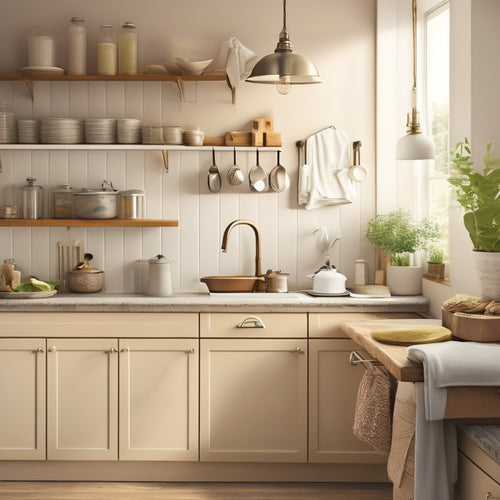
What's Holding You Back From a Clutter-Free Kitchen?
Share
You're struggling to achieve a clutter-free kitchen because one or more of eight common obstacles are standing in your way. Are you limited by a lack of storage space, inefficient workflow habits, or cluttered countertops and surfaces? Maybe disorganized kitchen cabinets, insufficient meal planning skills, or overwhelming kitchen gadgets are holding you back. Perhaps poor time management habits or unrealistic expectations and goals are derailing your efforts. Identifying the specific obstacles holding you back is the first step to overcoming them. Now, take a closer look at each of these common obstacles to discover how you can overcome them and achieve the clutter-free kitchen you've always wanted.
Key Takeaways
• Limited kitchen storage space and inefficient workflow habits are common obstacles to a clutter-free kitchen.
• Cluttered countertops and disorganized kitchen cabinets can lead to wasted time and energy.
• Insufficient meal planning skills and overwhelming kitchen gadgets can contribute to kitchen clutter and stress.
• Poor time management habits and unrealistic expectations can hinder efforts to maintain a clutter-free kitchen.
• Adopting minimalist decluttering strategies and implementing organizational systems can help overcome these common challenges.
Limited Kitchen Storage Space
Since you're likely no stranger to kitchen chaos, you've probably struggled with limited kitchen storage space at some point. It's frustrating when you can't find what you need, and clutter takes over your countertops.
To regain control, you need effective storage solutions that maximize your space. Start by evaluating your kitchen's layout and identifying areas that can be optimized. Consider installing shelves, hooks, or a pegboard to hang frequently used items, freeing up cabinet space. Implement a 'one in, one out' policy to maintain a balanced amount of kitchen essentials.
Next, adopt decluttering strategies that align with a minimalist approach. Get rid of duplicate or broken items, and be ruthless about keeping only what serves a purpose. Designate zones for specific tasks, like a coffee station or baking area, to keep related items organized.
Inefficient Workflow Habits
How do you navigate your kitchen while preparing a meal, and are your workflow habits setting you up for success or creating chaos?
Take a moment to ponder your kitchen workflow. Do you often find yourself moving back and forth between the fridge, stove, and sink, wasting valuable time and energy? Do you have a tendency to delay tasks until the last minute, leading to feeling overwhelmed and stressed?
Ineffective workflow habits can result in time wastage, turning meal preparation into a taxing and tiring activity. Additionally, a lack of prioritization and constant distractions can disrupt your workflow, causing you to lose concentration and drive.
You might be caught in a cycle of disorder, struggling to keep pace with meal preparation, cleaning, and cooking.
To break this cycle, it's crucial to identify and address these ineffective habits directly. By simplifying your workflow, removing distractions, and prioritizing tasks, you can take back control of your kitchen and cook with confidence and ease.
It's time to manage your kitchen workflow effectively and open the door to a more efficient, clutter-free cooking experience.
Cluttered Countertops and Surfaces
As you move around your kitchen, you're likely to notice that cluttered countertops and surfaces are major contributors to the chaos, making it challenging to find what you need when you need it. The clutter can be overwhelming, but addressing it directly is crucial to achieving a clutter-free kitchen.
Start by clearing everything off your countertops and sorting items into categories. Be firm – get rid of anything you don't need or use regularly.
Next, implement some decluttering tips and organization hacks to keep your countertops and surfaces tidy. Designate specific zones for different tasks, such as a coffee station or a baking area. Utilize vertical space by installing shelves or hooks to store infrequently used items. Invest in a utensil organizer or a spice rack to keep your countertops clear.
Disorganized Kitchen Cabinets
Now that your countertops and surfaces are organized, it's time to tackle the cluttered kitchen cabinets that are likely hiding behind closed doors. You've made great progress, but your kitchen won't feel truly clutter-free until you've conquered the chaos within those cabinets.
Start by purging items you no longer need or use. Be ruthless – if you haven't used it in the past year, it's probably safe to get rid of it.
Next, implement a pantry organization system that works for you. This might include baskets, bins, or shelves to keep items like food, spices, and cooking supplies organized and easy to access.
Don't forget about your drawers – use drawer dividers to separate utensils, cookware, and other items, keeping them organized and preventing clutter from building up again.
Insufficient Meal Planning Skills
You're likely wasting time and money by not planning your meals in advance, resulting in last-minute takeout orders and unused ingredients going to waste. By not having a clear plan, you're leaving room for spontaneity, but also for chaos. A clutter-free kitchen starts with a clear plan of action.
Take control of your meal planning by implementing a recipe organization system. This can be as simple as a digital note on your phone or a physical binder filled with recipes you love. Having a go-to list of meals will help you create a grocery list, avoiding impulse buys and reducing food waste.
When you know what you're cooking, you can make a precise grocery shopping list, avoiding unnecessary purchases and reducing clutter in your kitchen.
Overwhelming Kitchen Gadgets
With a clear meal plan in place, it's time to tackle the clutter caused by the abundance of kitchen gadgets that promise to make cooking easier but often end up collecting dust and taking up valuable counter space.
You're not alone in this kitchen tool overload; many of us have fallen victim to the allure of gadgets that promise to simplify cooking. However, the reality is that most of these gadgets remain unused, creating an unused gadget dilemma.
To overcome this, initiating the decluttering process is crucial. Begin by taking stock of your kitchen gadgets and sorting them into three categories: frequently used, occasionally used, and never used.
Be ruthless – if you haven't used it in the past year, chances are you won't miss it. Consider donating or storing items you don't use regularly.
Invest in storage solutions like hooks, baskets, or drawers to keep your frequently used gadgets organized and within reach.
Poor Time Management Habits
Frequently, poor time management habits sneak into your cooking routine, causing meal prep to take longer than expected and leading to frustration in the kitchen. You might find yourself stuck in procrastination habits, constantly delaying tasks until the last minute. This leads to time wasting tendencies, where you're left scrambling to prepare a meal, resulting in a cluttered kitchen.
Another pitfall is distraction tendencies. You get sidetracked by social media, emails, or phone notifications, causing you to lose focus on the task at hand. In addition, a lack of prioritization skills means you're not tackling the most important tasks first, leading to inefficiency and disorganization.
To break free from these habits, start by setting realistic timelines for meal prep and sticking to them. Eliminate distractions by turning off notifications or finding a quiet workspace. Prioritize tasks based on importance and deadlines, and tackle them one by one. By adopting these strategies, you'll be able to manage your time more effectively, freeing up space for a clutter-free kitchen.
Unrealistic Expectations and Goals
Setting unrealistic expectations and goals for your kitchen can lead to feelings of overwhelm, causing clutter to accumulate as you struggle to live up to unattainable standards. You may have perfectionist tendencies, aiming for a Pinterest-perfect kitchen, but this can lead to a fear of failure, causing you to procrastinate and avoid tackling the clutter altogether.
You're not alone in this challenge. Societal pressure to have a flawless kitchen can be intense, and it's easy to fall into the comparison trap, feeling like everyone else has their kitchen together except you. But the truth is, no one is perfect, and those Instagram-worthy kitchens are often staged for a photo shoot, not real life.
It's time to reassess your goals and expectations. Instead of aiming for perfection, focus on creating a functional, organized space that works for you and your family. Break down your goals into manageable tasks, and celebrate your small wins along the way.
Frequently Asked Questions
Can I Still Have a Clutter-Free Kitchen With Young Children?
You can still achieve a clutter-free kitchen with young children by implementing childproofing solutions and creative storage ideas, like cabinet locks and labeled bins, to keep kids' stuff organized and out of the way.
How Do I Maintain Momentum After Decluttering My Kitchen?
You'll maintain momentum by setting boundaries with family members and establishing consistent habits, like daily tidying and weekly meal prep, to keep your kitchen clutter-free and functional, even on the busiest days.
Will a Clutter-Free Kitchen Really Save Me Money?
You'll save money with a clutter-free kitchen, as you'll avoid buying duplicates, reduce food waste, and optimize meal planning, ultimately leading to significant cost benefits and a more efficient you.
Can I DIY My Kitchen Organization or Do I Need a Professional?
As you navigate the jungle of kitchen clutter, you're faced with a fork in the road: DIY or hire a pro? Weighing the cost of each, consider child-friendly storage solutions and your budget's boundaries.
Will My Family Adapt to a New, Clutter-Free Kitchen Routine?
You'll need to contemplate your family dynamics and how they'll adjust to a new routine. It's vital to anticipate shift challenges and guarantee family acceptance, but with a clear plan, you can overcome obstacles and maintain a clutter-free kitchen.
Related Posts
-

Baked Kale
Kale is one of the most healthiest and nutritious plant foods in existence and is delicious! Try these baked kale re...
-

5 Best Kitchen Organization Products for Arthritis Relief
You're looking for ways to make meal prep easier on your joints. Arthritis can make kitchen tasks a struggle, but the...

